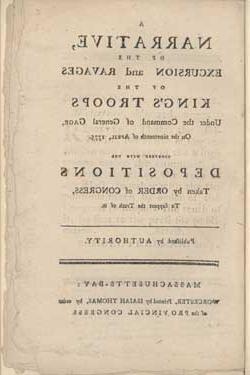A Narrative, of the Excursion and Ravages of the King's Troops Under the Command of General Gage, on the nineteenth of April, 1775: Together with the Depositions ...
To order an image, navigate to the full
display and click "request this image"
on the blue toolbar.
-
Choose an alternate description of this item written for these projects:
- Main description
[ This description is from the project: Coming of the American Revolution ]
In order to sway public and official opinion, the Provincial Congress rushed to print nearly 100 copies of these collected depositions, prefaced by a letter from Joseph Warren. Congress hoped to make an impression in London before the arrival of General Gage's own report to Parliament on the clash at Lexington and Concord.
The Militia Pleads Innocent
On 25 April, the Provincial Congress learns that General Gage plans to send his report on the clash at Lexington and Concord to Parliament. He has hired the Sukey, a vessel owned by Boston merchant John Rowe, to carry the correspondence. Fearful that Gage might win the battle for public and official opinion, the Congress rushes to print nearly 100 copies of its own collected depositions, prefaced by a letter from Joseph Warren. Hiring the Quero, a fast schooner out of Salem, the Congress instructs its owner and captain to make haste and secretly deliver the depositions to the Lord Mayor of London. The Quero arrives two weeks ahead of the Sukey. Before Gage's account is known to exist, the American narrative is already spread across the London papers.
Questions to Consider
1. Describe the tone of the narrative. Support your description with words and phrases from the document.
2. Who is the captain of the Lexington militia? According to his deposition, who fired the first shot at Lexington Green?
3. According to Zechariah Brown and Thomas Davis Jr., what is rumored to have happened to the bodies of the regulars killed at Concord? Who do you think would have started this rumor and why?
4. Describe the testimony of Hannah Adams--what happens to her and her home? How is her testimony different from most of the other depositions? Why do you think the Provincial Congress includes this deposition in the pamphlet?
Further Exploration
5. Compare the Narrative with another account of the events at Lexington and Concord. What is the same in each narrative? What is different?

